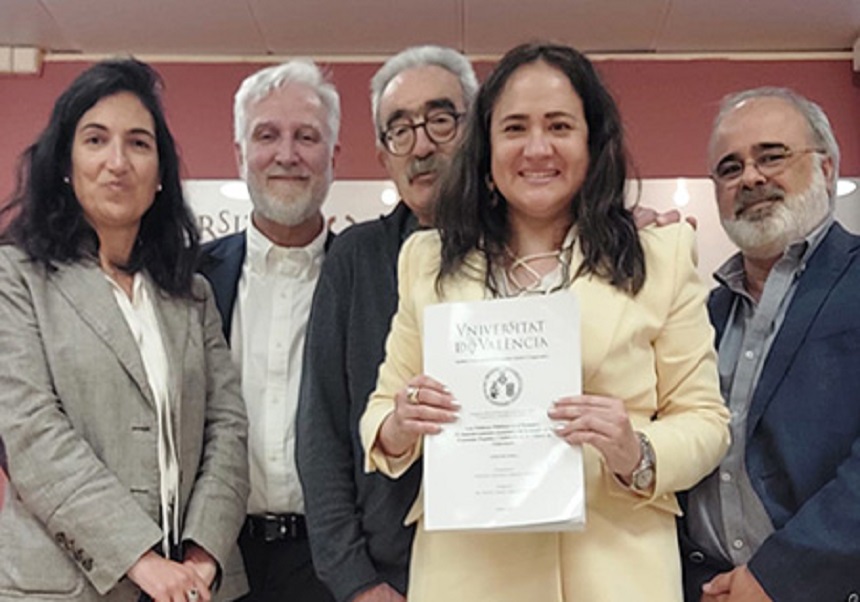
Carolina Verzosi defended her doctoral thesis on 7 May at the Faculty of Economics of the University of Valencia (UV). The thesis was supervised by Miguel Ángel García Calavia, professor emeritus at the UV
The public defence was held before a tribunal chaired by Professor Ignacio Martínez Morales, from the University of Valencia; the secretary was Professor María José Díaz Santiago, from the Complutense University of Madrid, and the member was Professor Ángel Olaz Capitán, from the University of Murcia.
According to the author, the main objective of this research was to analyse public policies on the popular and solidarity economy and their contribution to the economic empowerment of women in organisations in this sector in the city of Guayaquil.
The study is of interest because it was not known whether these policies are contributing to the economic empowerment of women in Ecuador, specifically in the city of Guayaquil, despite their institutionalisation. Hence its civic, but also scientific, interest in relation to the Popular and Solidarity Economy.
The research is structured in two parts: the first is theoretical and the second is empirical.
The first part provides a conceptual approach to the popular and solidarity economy and a series of proposals on its unique configuration and potential, as well as public policies for the Popular and Solidarity Economy (PSE) and economic empowerment, in order to provide a conceptual toolkit from which to approach the research. Next, the labour market in Guayaquil is characterised and a series of labour indicators are selected to describe its current situation and evolution.
In addition, the concept of the popular and solidarity economy as set out in Ecuador's legal texts is presented, identifying public policies for the Popular and Solidarity Economy. The research itself highlights the inequality and precariousness faced by women.
The second part presents the empirical comparison. It compares whether EPS public policies are contributing to economic empowerment and examines the economic empowerment of women in associated work.
In the conclusions of the research, Verzosi explains the implementation of policies on the popular and solidarity economy in women's lives, and how these do not fully satisfy or fulfil their design.
Furthermore, public policies, in general, are not always aligned with the Organic Law on the Popular and Solidarity Economy, which seeks to eliminate administrative obstacles. Similarly, women mention the lack of coordination of the policies promoted in different areas of the state.
In addition, access to and enjoyment of certain government programmes is not always easy due to the complexity of the approved procedures, which can discourage women and create bad experiences.
Thus, policies sometimes fail to address the situation of women in a unique way, despite the state's obligation to promote gender equality, according to the Constitution.
Finally, women regret the lack of greater government attention to their needs and call for greater participation in the definition of training and education policies, whose measures do not always reach everyone, or in financing and public procurement.
Women's participation
The collaborative work of women observed in the research highlights their role in improving their decision-making capacity. It also highlights the importance of the popular and solidarity economy based on co-management and social welfare, as well as entrepreneurship to reduce inequalities.
The participation of these women in their associations, where each one has a voice and a vote, strengthens them and encourages mutual support. This is even more important given Ecuador's great ethnic diversity, which is also evident in the popular and solidarity economy. This legally supported form of economy is a healthy alternative to the traditional economy.
This work leaves open a future research agenda that addresses, among other issues, women's working hours, work-life balance policies, the use of information technologies and types of leadership. It also proposes to study the process of co-constructing policies in this sector in Guayaquil, and the participation of academia and women in these formulations.
According to the author, the research also opens up possibilities for analysing the reality of public policies on the Popular and Solidarity Economy in other cities in Ecuador and Latin America.
The thesis can be consulted in the institutional repository of the UV Roderic: https://hdl.handle.net/10550/110236





